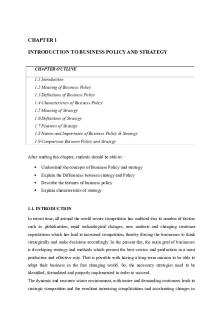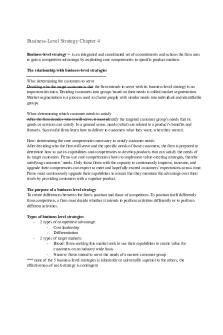Business Policy and Strategy WA 4 PDF

| Title | Business Policy and Strategy WA 4 |
|---|---|
| Course | Business Policy and Strategy (proctored course) |
| Institution | University of the People |
| Pages | 4 |
| File Size | 61.9 KB |
| File Type | |
| Total Downloads | 71 |
| Total Views | 179 |
Summary
Biocon India Group (Case Study)...
Description
Biocon India Group (Case Study)
BUS 4403
December 09, 2020
University of the People
This assignment is about the Biocon India Group (case study) which is a pharmaceutical business in India. In this essay, I will discuss a brief background of its business and the strategic choices faced by the management that will help it to grow. Biocon India Group was established in 1978 by Kiran Mazumdar-Shaw, the Managing Director, as a joint venture with Biocon Ireland to bulk manufacture enzymes. Then it was acquired by Unilever in 1989, thus as a part of Unilever, the company began producing enzymes for Unilever’s food business. As time went by, in 1998 the company bought Unilever’s share and became an independent, privately-owned entity (Kalegaonkar, Locke, & Lehrich, 2008). Moreover, now the company mainly deals with fermentation processes and is now focused on chemical and biological research which is under Syngene and Clinigene which is a new subsidiary being created focused on Clinical Trials (Kalegaonkar, Locke, & Lehrich, 2008). Furthermore, the strategic choices that are facing this company include its main focus on the current business as to stand out in the competitive global generic pharmaceuticals industry with the Syngene subsidiary. The business expansion is promising as it provides Contract Research Services. Also, the other thing that can help it is moving into different pharmaceutical services. About the key groups, I have already mentioned them, but just in case of fully understanding the company comprises Biocon, which mainly deals with fermentation processes and Syngene, which is a subsidiary within the Group focused on chemical and biological research, and Clinigene which is a new subsidiary being created focused on Clinical Trials, senior leaders, key scientists, and lab employees (Kalegaonkar, Locke, & Lehrich, 2008).
Moreso, in regards to relationships, it all started from a mutual trust between the colleagues as they were collaborating and sharing knowledge. Then, in terms of the rewards for expansion, every individual involved in a project must be the main player in contract research contract and come up with new skills and ideas, therefore in the Biocon case study, rewards of expanding business will include being a key player in contract research organizations (CROs), special recognition in the Indian Parliament, and a grant award from the United Nations. On the other hand, the risks of expansion will include the diversion of resources away from Biocon and Syngene to grow Clinigene. The primary structure of the company is non-hierarchical and that makes it distinctive because decision-making is easier and faster thereby enabling various professionals to exchange research information among themselves. Also, the threats include the new entrants as its structure is open and non-hierarchical. Looking at the facts of this company and analyzing the Boston Consulting Group Portfolio Analysis, I will say that Syngene is the Cash Cow of the business. This means that that is the area of the business which is generating income at the moment. But we know from the case that it is facing a lot of competition. And Clinigene is the Star portfolio, which means that it has the potential to grow but currently needs the investment of resources to grow it. In conclusion, the best decision Biocon can take for the future growth of their business is to channel the resources from the Syngene (the Cash cow) into Clinigene which is considered Star and has a future potential (BCG group).
REFERENCE Kalegaonkar, A. Locke, R. & Lehrich, J (2008) Biocon India Group Retrieved from: https://my.uopeople.edu/pluginfile.php/321919/mod_page/content/7/BioconIndiaGroup .pdf...
Similar Free PDFs

Business Policy & Strategy
- 28 Pages

STA-201 WA # 4 - WA#4
- 2 Pages

CH 4 - Business Level Strategy
- 9 Pages

Business Policy and Strategic Management
- 458 Pages

Business Strategy
- 60 Pages

Business Strategy
- 12 Pages

Business Policy notes
- 73 Pages
Popular Institutions
- Tinajero National High School - Annex
- Politeknik Caltex Riau
- Yokohama City University
- SGT University
- University of Al-Qadisiyah
- Divine Word College of Vigan
- Techniek College Rotterdam
- Universidade de Santiago
- Universiti Teknologi MARA Cawangan Johor Kampus Pasir Gudang
- Poltekkes Kemenkes Yogyakarta
- Baguio City National High School
- Colegio san marcos
- preparatoria uno
- Centro de Bachillerato Tecnológico Industrial y de Servicios No. 107
- Dalian Maritime University
- Quang Trung Secondary School
- Colegio Tecnológico en Informática
- Corporación Regional de Educación Superior
- Grupo CEDVA
- Dar Al Uloom University
- Centro de Estudios Preuniversitarios de la Universidad Nacional de Ingeniería
- 上智大学
- Aakash International School, Nuna Majara
- San Felipe Neri Catholic School
- Kang Chiao International School - New Taipei City
- Misamis Occidental National High School
- Institución Educativa Escuela Normal Juan Ladrilleros
- Kolehiyo ng Pantukan
- Batanes State College
- Instituto Continental
- Sekolah Menengah Kejuruan Kesehatan Kaltara (Tarakan)
- Colegio de La Inmaculada Concepcion - Cebu








